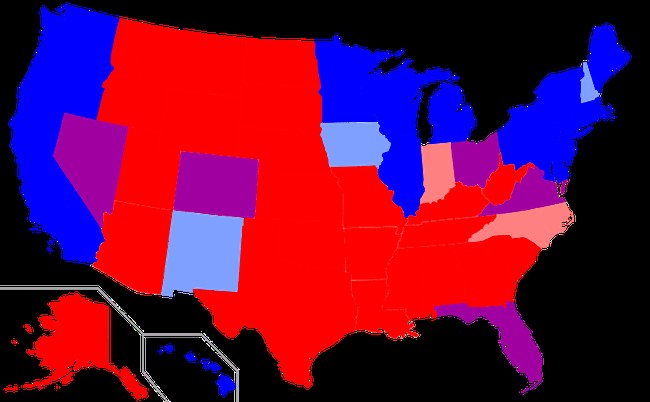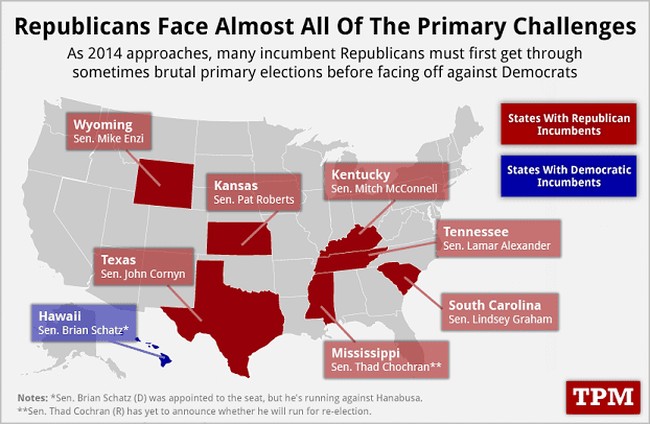One of the favorite sports of the GOP establishment these days is predicting the end or the inevitable irrelevance of independent conservative candidates for the House and Senate. The Washington Post’s Jennifer Rubin takes up the cudgel in a story call Where can the tea party win?
The tea party we have seen this primary season is outmatched easily when it takes on mainstream, competent Republicans. It cannot win against such candidates even in extremely conservative venues such as the Idaho 2nd congressional district or the state of Kentucky. It can win with superbly qualified candidates who have mainstream appeal when the tea partiers jump on board with establishment Republicans. And it might win narrowly in ultra-conservative places when the incumbent lacks redeemable qualities. Maybe it should stick to the last two categories (e.g. Ben Sasse in Nebraska, Joni Ernst in Iowa and McDaniel in Mississippi) while steering clear of the first group (e.g. challenging Mitch McConnell or John Cornyn). And it certainly should be avoiding altogether those swing states in which far-right candidates will be clobbered in a general election (e.g. Colorado, Nevada, Delaware, Indiana, Missouri) — that is, places where it would damage the GOP and lose the potential to take a Senate majority.
To the extent that tea party=conservative and insurgent, then this assessment is probably correct in the current year. Rubin goes on to state
In short, tea partiers can succeed in deep-red places running against cruddy establishment candidates, while establishment candidates with personal and political appeal can keep the base and win outside it. You really have to be in Fantasyland, or be a very cynical self-promoter, to think that the party should choose on a nationalized basis to follow the gang that can barely win in a Mississippi midterm election primary and not the party that can win Mississippi but also Florida, Ohio and Colorado.
Excluding Marco Rubio (who, last I looked, was from Florida) this article is simply wrong. David Dewhurst was not a cruddy establishment candidate, he was an excellent establishment candidate. He was simply rejected by voters in favor of a more conservative choice. The same can be said of Bob Bennett in Utah.
But on to the broader question of where a conservative/tea party candidate can win, let’s look at the electoral outcome of the 2000, 2004, 2008, and 2012 elections. The states in dark red went GOP all four times, pink signifies they were GOP three times.
So the answer to where conservative/tea party candidates can win seems to twenty-two states though the fact that Marco Rubio beat the establishment candidate Orange Charlie Crist in a purplish Florida indicates that the principle so small government and free enterprise appeal outside heavily red states.
In Rubin’s diatribe she sets up a series of false choices. First, knocking off any incumbent, no matter how incredibly bad he or she is, is a herculean task Since 1990 only 8 incumbent senators have been dislodged in primary elections, five of those have been Republicans. In 1996 Sam Brownback defeated Sarah Frahm, in 2002 John Sununu beat Bob Smith, 1n 2010 Bob Bennett, Arlen Specter, Lisa Murkowski all failed to be nominated by their parties, and in 2012 Richard Lugar was retired. Of these, it is really hard to call Sununu a conservative/tea party type. When one looks at the outcomes, the conservative/tea party groups have succeeded four times in two election cycles. On the whole, not bad.
Rubin also misses the overall strategy afoot here. Conservatives/tea party candidates are not a third party (yet!) but an ideological insurgency operating within the GOP. As such, we are much like George Washington’s Continental Army. Washington didn’t have the ability to win for most of the war but that was not relevant in a strategic sense, his strategy was to retain an army-in-being as a focal point for resistance and bleed the British. The same calculus applies to conservative/tea party challenges to incumbent senators and representatives as applied to the budget fights in 2012. To quote my colleague, Dan McLaughlin:
Washington’s approach didn’t just help his army avoid annihilation or capture until it could grow stronger and obtain outside help. It also staved off an ever-threatened collapse in morale, as Washington’s men avoided more of the kind of disastrous routs that would lead to more desertions and fewer recruits.
What Rubin and largely the GOP establishment fails to realize is that we KNOW we aren’t going to win all of these fights but we, like Washington, also know that we must fight regularly on the most favorable terrain if we are to learn how win and if we are to keep our army in the field.
Via TPM, this year GOP senators face primary challenges in six states:
I would argue that two of these, the challenges to Mitch McConnell and Thad Cochran, were serious efforts, though arguably Dr. Milton Wolf’s effort against Senator Pat Roberts could be included.. We will win half of those fights. John Cornyn and Lindsey Graham have been forced to spend money and he has moved himself further to the right that otherwise would have been the case. McConnell himself won in part by portraying himself as the conservative in the race. Lamar Alexander, alone, is unphased by the challenge though he has had to spend a lot of money to strangle the opposition in its crib.
So the short answer to Rubin, conservative/tea party candidates can win everywhere they run. They win either in absolute terms by gaining the nomination or they move their opponent to the right.
As Erick pointed out a few days ago, we are in this for the long game:
And here is the dirty little secret. The establishment largely has to win every one of their races. The grassroots do not. We just need to add to the ranks of conservatives in the Senate. And we are doing that. The establishment and grassroots are playing two different games. The establishment can pour money in and win in most cases as they have done. But the grassroots can just keep nibbling away.
(a h/t to BuzzFeed’s Dave Stopera for the image and my colleague Aaron Gardner for the inspirational use for it)
















Join the conversation as a VIP Member